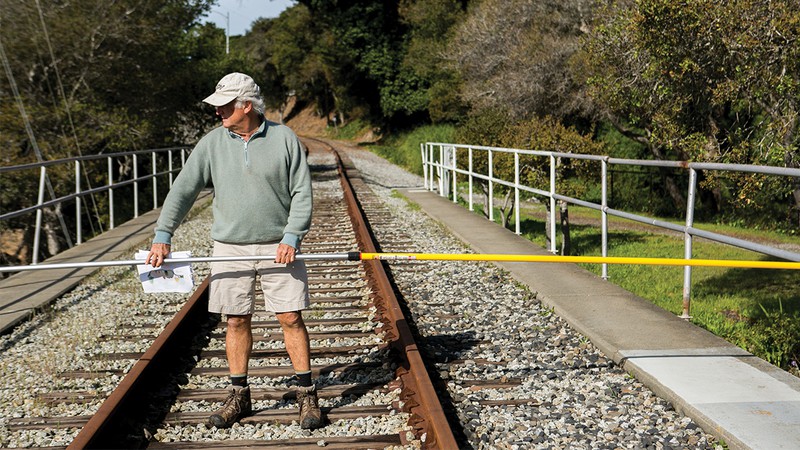Jacob Pierce’s articles from 2018 scrutinize proponents on all sides

Miles Reiter, an opponent of rail and a board member for Greenway, walks the railroad tracks with a pole to show the width of the corridor. Keana Parker
In the spring of 2018, longtime Santa Cruz Weekly/Good Times reporter Jake Pierce put together an investigative series on what was already a long-running battle over a complex issue. The series made clear that the Santa Cruz Branch Line, which Pierce calls “perhaps the most contested piece of real estate in the entire Monterey Bay,” had already become an information-war zone. The fight has heated up in the years since, and Santa Cruz County voters will decide whether to continue persuing rail service on June 7, 2022.
Over five installments, Pierce walked through the project’s history from various perspectives and introduced activists on both sides of the issue.
In Part 1, headlined “How the Rail Trail Became the County’s Most Divisive Issue,” Pierce talks with activists about the rail corridor’s future and asks whether either side can be trusted: “‘What the fuck are they talking about?!’ yells Reiter, smacking his copy of the MBSST plan with the backside of his hand. We’re standing in Aptos Village staring at the corridor—both in front of us and via the renderings on the page. Reiter didn’t even bother to bring his measuring rod with him out of the car for this segment, and he doesn’t have to.”
In Part 2, “RTC on Verge of Approving Next Freight Operator,” he reports on the RTC’s efforts to finalize a contract with Progressive Rail: “Gail McNulty is the executive director for Greenway, which supports tearing up the tracks for a wider trail, and she worries that Progressive Rail has ulterior motives, given McKenzie’s previous ties to the oil industry. She believes that Progressive, if approved, could end up drilling offshore in the Monterey Bay—even penning a post on Greenway’s website titled ‘Tell the RTC to Protect Our Coast!’ If that sounds like fear-mongering, that’s because it almost certainly is.”
Part 3, “What Rail Trail’s Segment 7 Means for the Rest of the Project,” explains that as construction on the path ready to go out to bid, critics are seeing signs of trouble: “To supporters of the rail trail, the plans for what is known as Segment 7 are a triumph of creative engineering. But upon closer inspection, they also offer hard evidence that critics have been right about some of the problems the rail trail will face that have been downplayed by train proponents.”
In “Rail Opponents: RTC Is Moving Too Fast With Progressive Rail,” the reporter covers news on the commission’s contention that state and federal rules require it to pick a new freight operator quickly: “If the long-winded rail trail saga were a romantic comedy, the RTC and Progressive would be standing at the altar, ready to get hitched—while Greenway, which has an admittedly strained relationship with the RTC, runs down the aisle yelling ‘I object!’”
And finally, in “More to Learn on Rail Trail’s Future,” activists and politicians prepare to dissect the Unified Corridor Study: “Although PRT systems come in various forms, some resemble the Sky Glider bucket ride at the Santa Cruz Beach Boardwalk more than they do a traditional transportation network.”